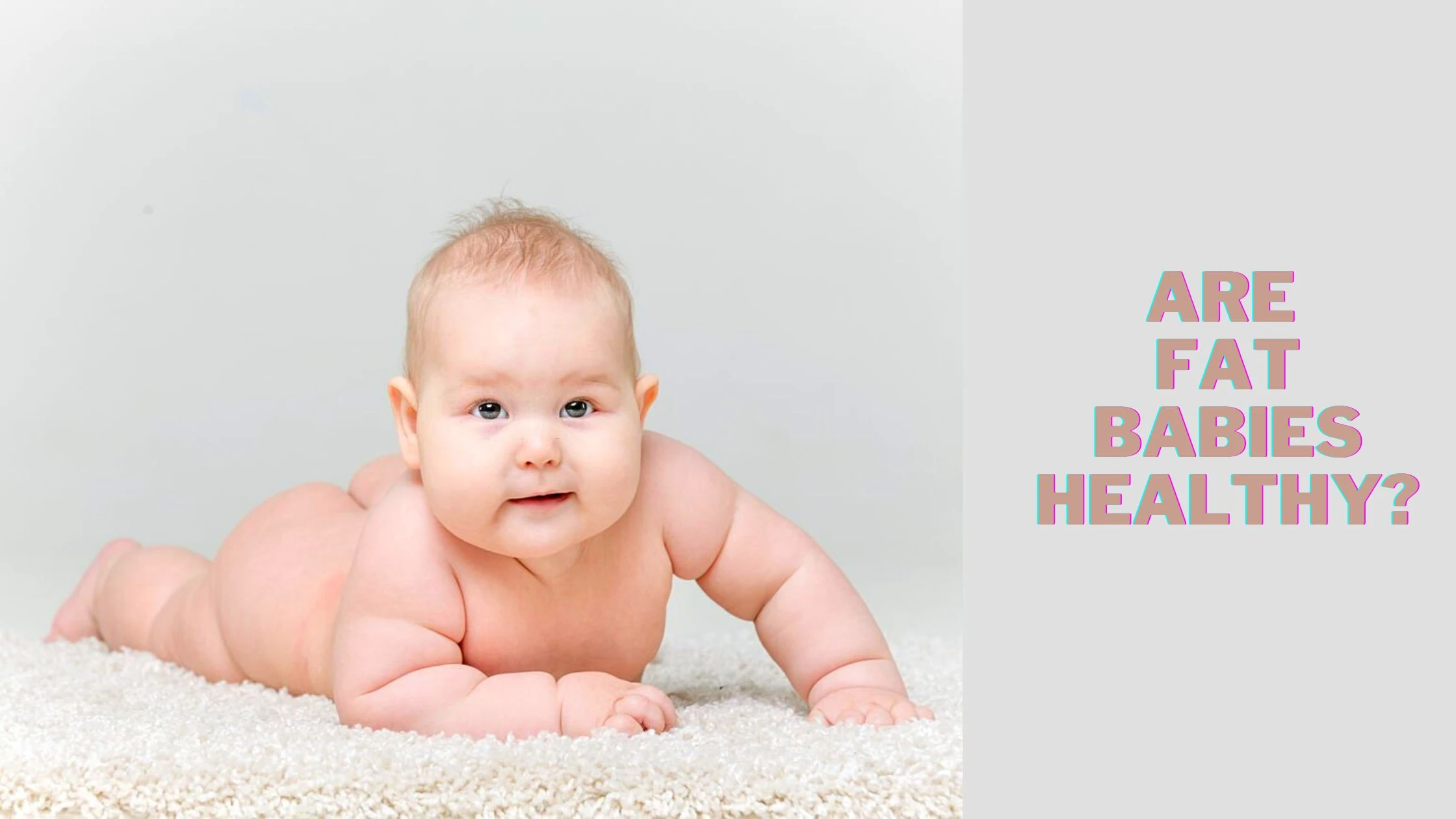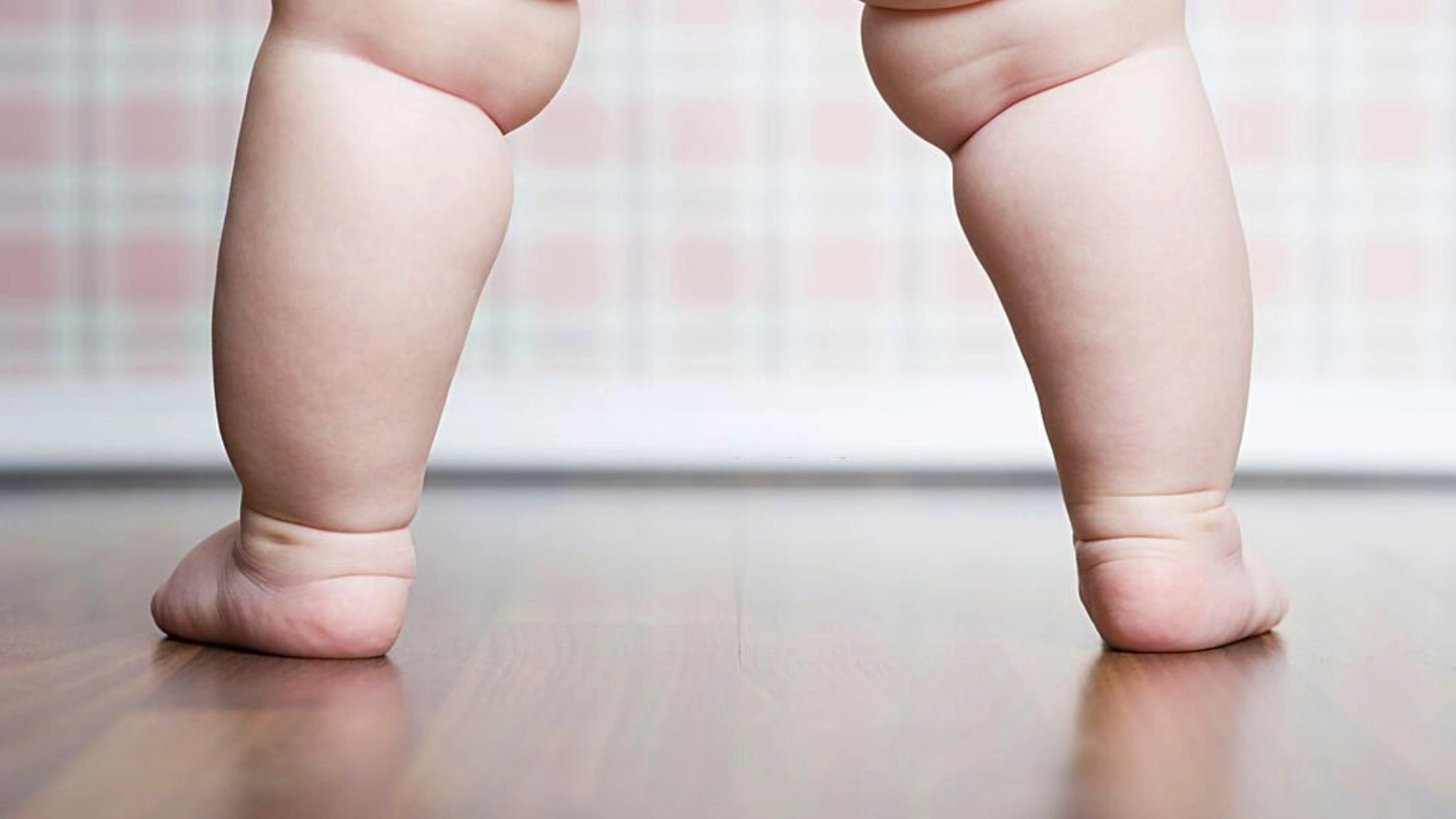Are Fat Babies Healthy? Or Is That A Sign Of Obesity?

There are times when one gets comments such as “your baby is so chubby”. Such comments can make you wonder about the health of your baby and whether they are okay to be like that.
If you are a parent who has a chubby baby and wondering whether your baby is healthy or not, this article is for you. Read on to know more about whether fat babies are healthy or not.
Is Your Baby Too Fat? How To Know?
Most babies will be fat when they are born. They are distinguished by those chubby cheeks, adorable ankles, and wrist roles. In most cases, a fat baby need not be an obese baby. Most babies gain weight and it is a natural process.
According to many pediatricians, babies have a higher chance of doubling up their birth weight by 5 months and by 12 months, it will be tripled. Based on the statistics from the baby growth chart issued by the World Health Organization, a healthy baby boy will weigh around 9.9 pounds and the average weight of a healthy baby girl will be around 9.4 pounds.

But many pediatricians point out that deviations from this can be quite normal. One of the ways to identify whether your baby is overweight or not is to check his/her BMI. BMI is body mass index which is a value that is calculated using the mass and height of a person. By calculating the BMI of the baby with the help of a pediatrician you can identify whether your baby is overweight or obese.
Factors that make some babies heavier than others
Many factors affect the weight of your baby. Some of them are listed below:
👉🏻 Genetics: One of the crucial factors that makes some babies heavier than others is genetics. A baby gets its genes from its parents. So the characteristics of these parents will have an impact on the weight of the baby. If the parents are usually small, the baby also becomes smaller.
👉🏻 Maternal age: Another important factor that decides the weight of the baby is the age of the mother. Studies show that mothers under the age of 20 have more chances to have smaller babies than mothers who are above 20.
👉🏻 The number of babies: Some studies have found that a factor that determines the weight of a baby is the number of babies. The first child always has a lower body weight compared to the second child. Scientists haven’t found an exact reason for this. It is speculated that as the mother has more experience in her second pregnancy than the first, the chances for the baby to be bigger and healthier can be higher.
👉🏻 Ethnicity: Another factor that decides whether a baby is obese or not can be ethnicity. A study published in the Journal of Perinatal Medicine in 2018 elucidated the connection between ethnicity and birth weight. Such studies explain that babies born to certain ethnicities such as Africans have relatively lower birth weights compared to other races. Even though the proper reason for this hasn’t been found, the relative situation of poverty in these countries can be a reason for lower birth weight.
👉🏻 Length of gestation: The duration of your pregnancy is an important factor that decides the weight of your baby. If your baby is born at 32 weeks, it is going to weigh less than a baby which is born at 40 weeks. This is because babies gain weight during the latter stages of pregnancy. That is why premature babies usually have lower weight.
👉🏻 The health of the mother: An important factor that decides the weight of your baby is maternal health. Certain health conditions of the mother can have an impact on the weight of the baby. It has been found that if the mother has conditions such as diabetes while pregnant, the chances are more for the baby to gain weight.
- 👉🏻 Dietary habits of the mother: A study published in the Journal of Food, Nutrition, and Population Health in 2021 found that the food habits of the mother during pregnancy will have an impact on the weight of the baby. According to this study, poor dietary choices and habits like smoking, drinking, etc can lead to lower birth weight in babies.
- 👉🏻 Maternal weight gain: Women gain weight during pregnancy. Studies show that women who put on more weight than their pre-pregnancy time will have a higher chance of giving birth to bigger babies. Similarly, women who put on less weight than their pre-pregnancy period will have a higher chance of having lower-weight babies.
Get more information: Newborn Weight Gain – Get Rid Of All Your Doubts
Are Fat Babies Healthy?
Studies show that the fat rolls on the legs and arms of babies are perfectly normal. When a baby is born, 15% of the weight of the baby will be fat. Most pediatricians think that the bulkiness associated with babies need not be a concern. It is quite natural for them to gain weight during the first year. Also, 95% of the fat in a baby is subcutaneous white adipose tissue and the remaining 5% is brown fat.

Research shows that this brown fat is helpful for the baby to maintain several of its body functions such as regulating temperature. Many studies have established the connection between the fat tissues in human babies and brain function. Based on this, brown fat in babies can act as an energy reservoir for aiding brain growth.
So what all these studies and researches show is that baby fat up to a certain limit is considered as healthy and one need not be alarmed by that.
Ways to keep your baby at a healthy weight
If you are concerned about the weight of your baby, there are certain measures you can choose. Some of these measures are listed below:
✅ Breastfeed often: One of the ways to keep the weight of your baby at a healthy measure is to breastfeed. As breast milk can fulfill all the nutritional needs of the baby, the chances of overfeeding can be less. While other baby foods can increase the weight of the baby and won’t be able to provide all the nutrients, breast milk can be sufficient for the nutritional needs of the baby.
✅ Do not feed the baby whenever it cries: It is quite natural for you to feed your baby whenever it cries. But doctors suggest that this practice is not healthy. Sometimes babies might be crying not because they are hungry, but because of some other reasons. Babies cry if they are bored, tired, or want to be held. So next time your baby cries, start by soothing it by holding, changing diapers, etc. If you respond to the cry with feeding it can lead the baby to associate everything with food which can cause health issues.
✅ Start by providing the baby with healthy food: When your baby reaches that age where some sort of solid food can be provided to it, feed him with nutrition-filled meals. This can be fruits, vegetables, fish, lean meats, etc. Avoid foods filled with added sugars or chemicals and opt for natural and organic alternatives.
✅ Train the baby to attend family meals: Giving your baby early training by bringing him along to your family meals will prevent any onset of obesity later. Family meals are usually healthy and babies who get early training to be a part can learn healthy eating habits.
✅ Make your baby move: Encouraging your baby to move maximum can be beneficial to keep its health at a normal point. Make spaces for them to walk and crawl. Carry them outside and once they can walk assist them in the process. All these can be helpful for the baby to maintain a healthy amount of weight.
Concluding Lines
On going through the points mentioned above, one can understand that all overweight babies necessarily need not be unhealthy. Several factors affect the weight of a baby. This can be genetics, maternal age, number of babies, maternal health and habits, etc.
Babies are usually born fat and plump and the fat deposit in their body is necessary to maintain certain bodily functions. If one is concerned about the weight of their baby, it is suggested that they should consult their pediatrician. By adhering to some strategies that involve breastfeeding, introducing healthy foods, practicing exercise, etc, one can balance a healthy weight for their baby.
FAQs
Baby fat starts to go away when the baby is around 12 months.
If the weight of your baby is more than 85% of the standard weight, your baby can be said to be at risk of obesity.
No, breastfeeding can reduce the risk of obesity and overweight in babies.





